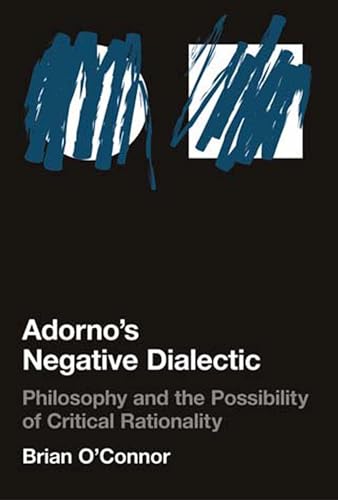Adorno's Negative Dialectic
Philosophy and the Possibility of Critical Rationality (Studies in Contemporary German Social Thought)
Brian O'Connor
BOOK REVIEW

In an era where black-and-white thinking dominates public discourse, Adorno's Negative Dialectic: Philosophy and the Possibility of Critical Rationality emerges not just as a philosophical text, but as a clarion call to re-examine our approach to reason and critique. Brian O'Connor delves into Theodor W. Adorno's complex ideas, offering readers a tantalizing glimpse into the intricacies of critical theory and its relevance today. This isn't just another academic tome; it's a profound exploration that challenges you to re-think the very foundations of rationality and social inquiry.
Adorno, a central figure of the Frankfurt School, views negative dialectics as a method that strives to reveal contradictions rather than reconcile them. O'Connor skillfully navigates this philosophical terrain, inviting readers to embrace complexity and ambiguity - something that has become increasingly relevant in our polarized world. Why settle for simplistic binaries when the truth often lies in the messiness of human experience? This text is a fervent invitation to resist complacency and engage with the uncomfortable.
The book meticulously unpacks Adorno's insistence on the power of critique, pushing against the tide of societal norms. O'Connor argues that critical rationality is essential for understanding the nuances of our modern existence. It's not mere academic jargon; it's a vital tool. The implications for fields like sociology, political theory, and even everyday interpersonal relationships are staggering. O'Connor's analysis highlights how Adorno's negative dialectic provides a framework for approaching modern dilemmas with an open mind rather than a closed fist.
Readers have been polarized by O'Connor's interpretations; some hail it as a significant contribution to contemporary philosophy, while others criticize its density and the challenging prose. Yet, therein lies the beauty of this work. To feel provoked is to engage deeply. A frequent criticism is that O'Connor sometimes obscures clarity with complexity, but isn't that exactly what Adorno's philosophy demands? To be tangled in thought and consideration, wrestling with the multifaceted nature of existence, can be profoundly enlightening.
The historical context of this work cannot be overlooked. Written in a post-9/11 world, it reflects the deep anxieties of an era characterized by terrorism, global conflict, and a backlash against reason itself. O'Connor carefully situates Adorno's theories amidst this chaos, making a compelling case for their resurgence in contemporary discourse. The relevance of critical rationality becomes starkly apparent as we navigate the murky waters of social media echo chambers and divisive politics. O'Connor's exploration provokes a visceral reaction; it shakes the reader from apathy and demands action and reflection.
Imagine the power of embracing contradictions - of standing firm in uncertainty. O'Connor makes a compelling case that Adorno's legacy isn't bound by time; instead, it transcends generations, calling each of us to embark on a journey of self-discovery and enlightenment. O'Connor brilliantly allows Adorno's voice to resonate across time, merging it with pressing contemporary issues and igniting a fire of intellectual curiosity within you. 🔥
Your thoughts might race as you grapple with the idea of embracing negativity as a pathway to growth. It's not merely academic; it's a bold emotional exploration. O'Connor shows us that through engaging with the negative, we can uncover deeper truths about our society and ourselves. It serves as a sobering reminder that being comfortable in our beliefs can blind us to broader realities.
As you navigate through O'Connor's eloquent prose, allow yourself to be challenged, shocked even. In that moment of discomfort lies the opportunity for radical new ways of thinking. This book doesn't just present new ideas; it compels you to engage with them, reflect on your own beliefs, and emerge transformed. Don't shy away from discomfort; it's a sign of growth.
Ultimately, Adorno's Negative Dialectic: Philosophy and the Possibility of Critical Rationality is not simply a philosophy book; it's a profound exploration of what it means to think critically in a world that often resists complexity. O'Connor invites you to embrace the challenge, promising that within that tension lies the possibility for genuine understanding and change. So why wait? Dive in, and discover the rich tapestry of thought that could alter your perspective in ways you've never anticipated. Your journey toward critical engagement and understanding starts here. 🌌
📖 Adorno's Negative Dialectic: Philosophy and the Possibility of Critical Rationality (Studies in Contemporary German Social Thought)
✍ by Brian O'Connor
🧾 224 pages
2005
#adornos #negative #dialectic #philosophy #possibility #critical #rationality #studies #contemporary #german #social #thought #brian #oconnor #BrianOConnor